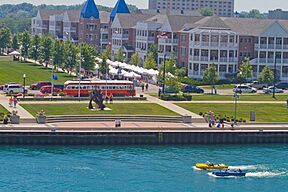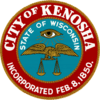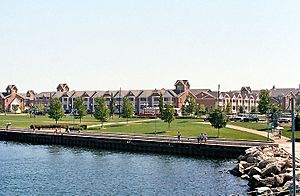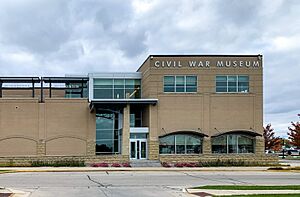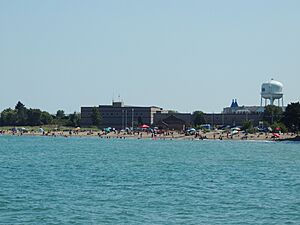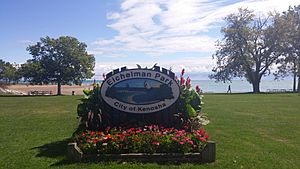Kenosha, Wisconsin facts for kids
Quick facts for kids
Kenosha, Wisconsin
|
|||
|---|---|---|---|
|
HarborPark on Lake Michigan
A streetcar passes the county courthouse
Gilbert M. Simmons Memorial Library
|
|||
|
|||
| Nickname(s):
K-Town
|
|||
| Motto(s):
Chart a Better Course
|
|||
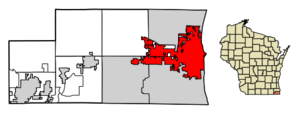
Location of Kenosha in Kenosha County, Wisconsin
|
|||
| Country | |||
| State | |||
| County | Kenosha | ||
| Settled (Pike Creek) | 1835 | ||
| Incorporated (village of Southport) |
February 9, 1841 | ||
| Incorporated (city of Kenosha) |
February 8, 1850 | ||
| Government | |||
| • Type | Municipality | ||
| Area | |||
| • Total | 28.45 sq mi (73.69 km2) | ||
| • Land | 28.36 sq mi (73.46 km2) | ||
| • Water | 0.09 sq mi (0.23 km2) | ||
| Elevation | 604 ft (184 m) | ||
| Population
(2020)
|
|||
| • Total | 99,986 | ||
| • Rank | 4th in Wisconsin | ||
| • Density | 3,684.1/sq mi (1,360.46/km2) | ||
| Demonym(s) | Kenoshan | ||
| Time zone | UTC−6 (CST) | ||
| • Summer (DST) | UTC−5 (CDT) | ||
| ZIP Codes |
53140–53144
|
||
| Area code(s) | 262 | ||
| FIPS code | 55-39225 | ||
| GNIS feature ID | 1567416 | ||
| Commuter Rail | |||
| Website | www.kenosha.org | ||
Kenosha is a city in Wisconsin, United States. It is the main city of Kenosha County. In 2020, about 99,986 people lived there, making it the fourth-largest city in Wisconsin. Kenosha is on the southwestern shore of Lake Michigan. It is about 40 miles south of Milwaukee and 66 miles north of Chicago. Kenosha has strong connections to both of these larger cities.
Kenosha used to be a big center for making cars. Many large factories were here, which helped the city's economy in the 1900s. When these factories closed in the 1980s, Kenosha slowly changed to an economy based more on services. In recent years, the city has seen more jobs and a growing economy. Big companies like Snap-on Inc., which makes tools, and Jockey International, a clothing company, have their main offices in Kenosha. The city is also home to several colleges, including the University of Wisconsin–Parkside and Carthage College. People who live in Kenosha are called Kenoshans.
Contents
Exploring Kenosha's Past
The area where Kenosha is now was first named by the Potawatomi people. They called it Kenozia, which means "place of the pike fish". The Menominee people called it Kenūsīw, also meaning "Northern Pike". These names refer to the many pike fish that would come into the rivers from Lake Michigan each year. This provided a lot of food for the people living there.
Scientists have found signs of very old human settlements near Kenosha. People lived in this area at least 13,500 years ago.
How Kenosha Began
The first European settlers arrived in the early 1830s. They came from New York, led by John Bullen Jr.. They were looking for land to start a new town. They arrived at Pike Creek on June 6, 1835. They built log cabins and later houses from wood and stone. The first school and churches were built soon after.
At first, the village was called Pike Creek. In 1837, it was renamed Southport. This name is still used today for a neighborhood, a park, and a school. In 1850, the village changed its name again to Kenosha. This name came from the Ojibwe word kinoje, meaning "pike" or "pickerel" fish.
Kenosha's Car-Making Days
From 1902 to 1988, Kenosha was famous for making millions of cars and trucks. Companies like Nash and American Motors Corporation (AMC) built vehicles here. In 1902, the Thomas B. Jeffery Company started making the Rambler car. The Rambler was one of the first cars to be mass-produced, meaning many were made quickly. It was also the first U.S. car to use a steering wheel instead of a tiller.
Later, Charles W. Nash bought the Jeffery company, and it became Nash Motors. In 1954, Nash joined with Hudson Motor Car Company to form American Motors Corporation (AMC). AMC made popular cars in Kenosha, like the Renault Alliance, which won "Car of The Year" in 1983.
After the car factories closed in the late 1980s, the land was redeveloped. The AMC Lakefront plant was torn down in 1990. This area is now called HarborPark. It has homes, a marina, parks, museums, and the Kenosha Electric Railway streetcar system.
Recent Events in Kenosha
From the early 1900s to the 1930s, many immigrants from Italy, Ireland, Poland, and Germany came to Kenosha. They helped build the city and added to its culture, architecture, and music.
In 2000, a classic electric streetcar system opened in downtown Kenosha. It helps people get around the downtown area and see the sights.
In 2021, a local turkey named "Carl the Kenosha Turkey" became very famous. He was seen as a symbol of hope for the city during tough times. Sadly, Carl was hit by a car and died.
In August 2020, there were protests and unrest in Kenosha. These events led to discussions about justice and community safety. Leaders like then-President Donald Trump and then-Presidential candidate Joe Biden visited Kenosha during this time. The city worked to restore order with the help of the Wisconsin National Guard.
Historic Places to See
Kenosha has many historic places listed on the National Register of Historic Places. These include the Library Park Historic District and the Civic Center Historic District. The city also has a Landmarks Commission that protects important local buildings like the 1929 YMCA and the St. Matthew Episcopal Church.
Kenosha's Location and Layout
Kenosha is in southeastern Wisconsin. It is next to Lake Michigan on the east. To the north is the village of Somers, to the west is Bristol, and to the south is Pleasant Prairie. Kenosha is about 32 miles south of Milwaukee and 49 miles north of Chicago.
The city covers about 27 square miles of land.
Neighborhoods to Explore
Kenosha has different kinds of neighborhoods. Some areas have many workers in factories or trades, while others have more office workers and students. The city is often divided into three main areas: Downtown, Uptown, and West of I-94. The north side of the city is home to the University of Wisconsin–Parkside and Carthage College.
Downtown Kenosha
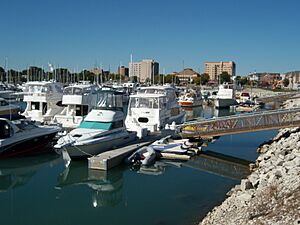
Downtown Kenosha is right on the Lake Michigan shoreline. It has government buildings, parks, beaches, restaurants, shops, museums, and places for entertainment. HarborPark is a neighborhood within downtown that has both homes and businesses. South of downtown is the Allendale neighborhood.
Uptown Kenosha
Uptown Kenosha has many local businesses and homes. Some well-known neighborhoods in Uptown include Brass, Lincoln Park, and Wilson Heights.
Kenosha's Weather
Kenosha has a climate with warm summers and cold winters. The hottest temperature ever recorded was 105°F in July 2012. The coldest temperature was -31°F in January 1985.
| Climate data for Kenosha, Wisconsin (1991–2020 normals, extremes 1944–present) | |||||||||||||
|---|---|---|---|---|---|---|---|---|---|---|---|---|---|
| Month | Jan | Feb | Mar | Apr | May | Jun | Jul | Aug | Sep | Oct | Nov | Dec | Year |
| Record high °F (°C) | 65 (18) |
74 (23) |
83 (28) |
90 (32) |
94 (34) |
102 (39) |
105 (41) |
102 (39) |
100 (38) |
89 (32) |
81 (27) |
70 (21) |
105 (41) |
| Mean maximum °F (°C) | 51.4 (10.8) |
54.1 (12.3) |
66.7 (19.3) |
77.9 (25.5) |
84.7 (29.3) |
90.8 (32.7) |
94.1 (34.5) |
91.7 (33.2) |
87.9 (31.1) |
79.2 (26.2) |
66.3 (19.1) |
55.1 (12.8) |
95.5 (35.3) |
| Mean daily maximum °F (°C) | 30.8 (−0.7) |
34.1 (1.2) |
43.1 (6.2) |
52.7 (11.5) |
63.6 (17.6) |
73.3 (22.9) |
79.7 (26.5) |
78.5 (25.8) |
71.9 (22.2) |
60.3 (15.7) |
47.3 (8.5) |
35.9 (2.2) |
55.9 (13.3) |
| Daily mean °F (°C) | 24.0 (−4.4) |
27.1 (−2.7) |
35.8 (2.1) |
45.0 (7.2) |
55.1 (12.8) |
65.1 (18.4) |
71.9 (22.2) |
71.1 (21.7) |
64.0 (17.8) |
52.4 (11.3) |
40.1 (4.5) |
29.3 (−1.5) |
48.4 (9.1) |
| Mean daily minimum °F (°C) | 17.1 (−8.3) |
20.1 (−6.6) |
28.5 (−1.9) |
37.4 (3.0) |
46.7 (8.2) |
56.9 (13.8) |
64.1 (17.8) |
63.8 (17.7) |
56.1 (13.4) |
44.5 (6.9) |
32.9 (0.5) |
22.8 (−5.1) |
40.9 (4.9) |
| Mean minimum °F (°C) | −5.1 (−20.6) |
0.7 (−17.4) |
10.5 (−11.9) |
25.0 (−3.9) |
36.5 (2.5) |
45.9 (7.7) |
55.0 (12.8) |
55.1 (12.8) |
42.2 (5.7) |
30.1 (−1.1) |
17.2 (−8.2) |
2.5 (−16.4) |
−9.1 (−22.8) |
| Record low °F (°C) | −31 (−35) |
−23 (−31) |
−9 (−23) |
10 (−12) |
26 (−3) |
33 (1) |
41 (5) |
40 (4) |
30 (−1) |
20 (−7) |
−5 (−21) |
−29 (−34) |
−31 (−35) |
| Average precipitation inches (mm) | 1.92 (49) |
1.83 (46) |
2.67 (68) |
4.19 (106) |
4.12 (105) |
4.13 (105) |
3.41 (87) |
3.68 (93) |
3.53 (90) |
3.51 (89) |
2.42 (61) |
2.19 (56) |
37.60 (955) |
| Average snowfall inches (cm) | 11.3 (29) |
9.8 (25) |
5.7 (14) |
0.8 (2.0) |
0.0 (0.0) |
0.0 (0.0) |
0.0 (0.0) |
0.0 (0.0) |
0.0 (0.0) |
0.1 (0.25) |
1.5 (3.8) |
7.0 (18) |
36.2 (92) |
| Average precipitation days (≥ 0.01 in) | 10.3 | 8.5 | 9.7 | 12.2 | 12.3 | 10.6 | 9.0 | 9.6 | 8.6 | 9.8 | 9.5 | 9.5 | 119.6 |
| Average snowy days (≥ 0.1 in) | 6.6 | 5.2 | 2.7 | 0.5 | 0.0 | 0.0 | 0.0 | 0.0 | 0.0 | 0.0 | 1.2 | 4.1 | 20.3 |
| Source: NOAA | |||||||||||||
| Climate data for Kenosha, Wisconsin (Kenosha Regional Airport), 1991–2020 normals, extremes 1997–present | |||||||||||||
|---|---|---|---|---|---|---|---|---|---|---|---|---|---|
| Month | Jan | Feb | Mar | Apr | May | Jun | Jul | Aug | Sep | Oct | Nov | Dec | Year |
| Record high °F (°C) | 64 (18) |
77 (25) |
85 (29) |
89 (32) |
94 (34) |
100 (38) |
106 (41) |
100 (38) |
96 (36) |
87 (31) |
77 (25) |
68 (20) |
106 (41) |
| Mean maximum °F (°C) | 50.9 (10.5) |
52.2 (11.2) |
69.1 (20.6) |
81.0 (27.2) |
87.7 (30.9) |
91.5 (33.1) |
93.4 (34.1) |
91.7 (33.2) |
89.4 (31.9) |
80.5 (26.9) |
67.1 (19.5) |
56.3 (13.5) |
95.2 (35.1) |
| Mean daily maximum °F (°C) | 31.3 (−0.4) |
34.8 (1.6) |
45.4 (7.4) |
57.3 (14.1) |
69.0 (20.6) |
78.8 (26.0) |
83.8 (28.8) |
81.7 (27.6) |
74.8 (23.8) |
62.5 (16.9) |
48.5 (9.2) |
36.6 (2.6) |
58.7 (14.9) |
| Daily mean °F (°C) | 23.8 (−4.6) |
26.8 (−2.9) |
36.6 (2.6) |
47.1 (8.4) |
58.1 (14.5) |
67.8 (19.9) |
72.7 (22.6) |
71.2 (21.8) |
63.9 (17.7) |
52.7 (11.5) |
40.1 (4.5) |
29.5 (−1.4) |
49.2 (9.5) |
| Mean daily minimum °F (°C) | 16.4 (−8.7) |
18.9 (−7.3) |
27.9 (−2.3) |
36.8 (2.7) |
47.1 (8.4) |
56.8 (13.8) |
61.7 (16.5) |
60.6 (15.9) |
53.1 (11.7) |
42.8 (6.0) |
31.6 (−0.2) |
22.4 (−5.3) |
39.7 (4.3) |
| Mean minimum °F (°C) | −7.0 (−21.7) |
−5.7 (−20.9) |
7.5 (−13.6) |
22.9 (−5.1) |
32.6 (0.3) |
43.5 (6.4) |
48.9 (9.4) |
48.0 (8.9) |
38.8 (3.8) |
25.9 (−3.4) |
13.5 (−10.3) |
1.2 (−17.1) |
−12.0 (−24.4) |
| Record low °F (°C) | −28 (−33) |
−15 (−26) |
−13 (−25) |
15 (−9) |
24 (−4) |
32 (0) |
41 (5) |
41 (5) |
32 (0) |
19 (−7) |
4 (−16) |
−16 (−27) |
−28 (−33) |
| Average precipitation inches (mm) | 1.19 (30) |
1.07 (27) |
2.03 (52) |
3.63 (92) |
3.52 (89) |
3.69 (94) |
3.35 (85) |
3.56 (90) |
3.36 (85) |
2.90 (74) |
2.05 (52) |
1.53 (39) |
31.88 (809) |
| Average precipitation days (≥ 0.01 in) | 8.3 | 7.2 | 9.8 | 12.5 | 13.7 | 12.4 | 10.3 | 13.1 | 12.3 | 11.4 | 9.4 | 8.8 | 129.2 |
| Source 1: NOAA | |||||||||||||
| Source 2: National Weather Service (mean maxima/minima 2006–2020) | |||||||||||||
Who Lives in Kenosha?
| Historical population | |||
|---|---|---|---|
| Census | Pop. | %± | |
| 1850 | 3,455 | — | |
| 1860 | 3,990 | 15.5% | |
| 1870 | 4,309 | 8.0% | |
| 1880 | 4,039 | −6.3% | |
| 1890 | 6,532 | 61.7% | |
| 1900 | 11,606 | 77.7% | |
| 1910 | 21,371 | 84.1% | |
| 1920 | 40,472 | 89.4% | |
| 1930 | 50,262 | 24.2% | |
| 1940 | 48,765 | −3.0% | |
| 1950 | 54,368 | 11.5% | |
| 1960 | 67,899 | 24.9% | |
| 1970 | 78,805 | 16.1% | |
| 1980 | 77,685 | −1.4% | |
| 1990 | 80,352 | 3.4% | |
| 2000 | 90,352 | 12.4% | |
| 2010 | 99,218 | 9.8% | |
| 2020 | 99,986 | 0.8% | |
| 2023 (est.) | 98,211 | −1.0% | |
| U.S. Decennial Census 2010 2020 |
|||
In 2020, Kenosha had 99,986 people. About 24.6% of residents were under 18 years old, and 13.3% were over 65. The population was 48.7% male and 51.3% female. About 9% of residents were born in other countries. Most people (88.4%) had a high school education, and 25.7% had a college degree or higher.
Many people have moved to Kenosha from other cities and states. This is because of the city's museums, lakefront attractions, job opportunities, good schools, and lower living costs compared to other big cities nearby.
Kenosha's Economy and Jobs
Kenosha's economy is strong because it's located between Chicago and Milwaukee. Many people who live in Kenosha travel to these bigger cities for work. The Metra train system connects Kenosha to Downtown Chicago. People often commute for jobs in healthcare, manufacturing, and business services. Kenosha is a popular place to live because housing costs are lower than in Chicago, but people can still work in high-paying jobs there.
Big companies like Snap-on Tools and Jockey International have their main offices in Kenosha. Many warehouses and distribution centers for companies like Amazon and Uline are also located here. In 2022, a special indoor farm called Square Roots opened in Kenosha. It grows fresh produce using hydroponics (growing plants in water without soil) inside old shipping containers. This farm can grow millions of packages of food each year for the Chicago and Milwaukee areas.
Tourism is also important to Kenosha's economy. In 2015, visitors spent about $196.6 million in Kenosha County.
Downtown Kenosha is a lively area along Lake Michigan. Organizations like Downtown Kenosha Inc. help businesses and promote the area. In 2023, a big plan was approved to develop the downtown area even more. This plan includes new apartments, offices, shops, and hotels.
The Kenosha HarborMarket is a popular European-style farmer's market held downtown from May to October. It sells local food and handmade items. The downtown area also has over 50 restaurants, bars, and shops. Frank's Diner, which opened in 1926, is the oldest diner in the United States and has been featured on TV shows.
Kenosha has several museums near downtown:
- The Kenosha Public Museum
- The Dinosaur Discovery Museum
- The Kenosha Civil War Museum
- The Kenosha History Center
These museums are connected to the Smithsonian Institution, which means they have high-quality exhibits.
The city is also planning a new Kenosha Innovation Neighborhood (KIN). This will be a large area with a STEM Innovation Center, focusing on science, technology, engineering, and math. It will offer education, job training, and business opportunities. Colleges like UW-Parkside and Carthage College will work together on this project.
Arts and Culture in Kenosha
Kenosha's museums offer a lot to see and learn. The Kenosha Public Museum has a prehistoric woolly mammoth skeleton found in Kenosha. This skeleton is very old, about 14,500 years old, and shows that humans were in the Americas earlier than once thought. The museum also has exhibits on the Ice Age and art.
The Kenosha History Center is next to the old city water plant. It tells the story of Kenosha from the time of Native American settlements to today. The 1906 Kenosha North Pier Light is also nearby.
The Kenosha Civil War Museum, which opened in 2008, has an interactive exhibit called "The Fiery Trial." It shows the role of six Midwestern states during the American Civil War.
The Dinosaur Discovery Museum opened in 2006 in an old post office. It has a paleontology lab where scientists from Carthage College study fossils.
A maritime museum is located inside the restored 1866 Southport Light and Lighthouse Keeper's cottage. It shares stories from Kenosha's past as a port city.
Delicious Food in Kenosha
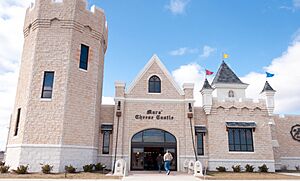
Kenosha has many types of restaurants, including supper clubs and German-American places. There are also two famous drive-in burger stands, The Spot and Big Star. Mars Cheese Castle, a well-known "cheese landmark," is also in Kenosha. Since many Italian-Americans live in Kenosha, you can find lots of Italian food, including pizza places and Tenuta's, a famous Italian grocery store.
In recent years, several craft breweries have opened in Kenosha. In 2021, the city hosted the Great Lakes Brew Fest.
Music and Entertainment
Kenosha has a lively music scene. The Kenosha Pops Concert Band performs in Pennoyer Park during the summer. The Kenosha Symphony Orchestra plays concerts in downtown Kenosha.
During July and August, the Peanut Butter and Jam Concert Series offers outdoor concerts every Thursday. There are also jazz events throughout the summer, like HarborPark Jazz.
Some bands, like Jungle Rot, started in Kenosha.
Fun Festivals
Kenosha hosts many summer festivals:
- Outta Sight Kite Flight (a kite festival)
- Taste of Wisconsin (a food festival)
- Pike River Rendezvous (a historical reenactment)
- Kenosha Classic Cruise-In Car Show (a car show)
- Celebrate America (a Fourth of July event)
- Food Folks & Spokes (a cycling event)
- Cheese-A-Palooza (a cheese festival)
- Border War Beer Fest (a beer competition)
Since 2017, Kenosha has also hosted Tribute Island, a three-day music festival on Simmons Island. It features many tribute bands playing on five stages.
Libraries for Learning
The Kenosha Public Library has four locations in the city: Northside, Southwest, Uptown, and Simmons Neighborhood Library. The beautiful 1900 Gilbert M. Simmons Memorial Library building is listed on the National Register of Historic Places.
Sports and Recreation
Kenosha has a long history of sports. The oldest sports club, the Kenosha Yacht Club, was founded in 1912.
Kenosha was home to the Kenosha Maroons NFL team in 1924. They played for a short time. The city has also had semi-professional football teams like the Kenosha Cardinals and the Kenosha Cougars. High schools in Kenosha, like Bradford and Tremper, have won state football championships.
Baseball has also been popular. The Kenosha Comets were one of the first teams in the All-American Girls Professional Baseball League from 1943 to 1951. Today, Kenosha is home to the Kenosha Kingfish, a college baseball team that won its first championship in 2015.
In 2022, Kenosha United F.C., a soccer team, started playing in the Premier Arena Soccer League.
Parks and Outdoor Fun
Kenosha has 8 miles of Lake Michigan shoreline, and almost all of it is open to the public. The city has 74 parks, covering over 780 acres.
Washington Park has the oldest operating velodrome (a track for bicycle racing) in the United States, opened in 1927. You can watch bicycle races there on Tuesday evenings during the summer.
Library Park has a statue of Abraham Lincoln and a veterans' memorial statue called "Winged Victory."
Petrifying Springs Park is a large 350-acre park with hiking trails, an 18-hole golf course, and a Biergarten. Kenosha has been recognized as a "Tree City USA" since 1982 for its efforts to care for its trees.
Beaches to Visit
Kenosha has several public beaches:
- Simmons Island Park and Beach (28 acres)
- Alford Park and Beach (57 acres)
- Eichelman Park and Beach (11 acres)
- Pennoyer Park and Beach (39 acres)
- Southport Park and Beach (24 acres)
Golf Courses
The Washington Park Golf Course opened in 1922. Its clubhouse, built in 1937, is a city landmark. There are also newer private golf courses, like The Club at Strawberry Creek.
Cycling Adventures
Library Park hosts Food Folks and Spokes, a festival with food, entertainment, and a bicycle race. Kenosha is also home to the Washington Park Velodrome, the oldest 333-meter track for cycling, opened in 1927.
Education in Kenosha

Public Schools
The Kenosha Unified School District runs 23 elementary schools, five middle schools, seven charter schools, and six high schools. These high schools include Mary D. Bradford High School, George Nelson Tremper High School, and Indian Trail High School and Academy.
Private Schools
Kenosha has several private schools, such as St. Joseph Catholic Academy, All Saints Catholic School, and Shoreland Lutheran High School.
Colleges and Universities
Kenosha is home to:
- The University of Wisconsin-Parkside (over 4,000 students)
- Carthage College (over 2,500 students)
- The Kenosha campus of Gateway Technical College
Other universities like Concordia University Wisconsin and Herzing University also have campuses in Kenosha.
Media and News
The main newspaper for Kenosha County is the Kenosha News. There are also local magazines like Happenings Magazine.
Kenosha is part of the Milwaukee television market, but because many people travel to Chicago, Kenosha's cable service also carries Chicago TV channels. Kenosha has several radio stations, including WLIP (1050 AM) and WGTD (91.1 FM).
Getting Around Kenosha
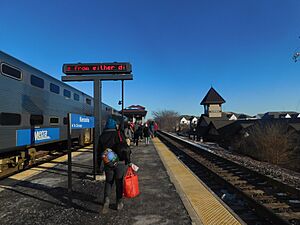
Kenosha is mostly a "car dependent" city, meaning most people use cars to get around. However, its downtown area is very walkable and bike-friendly.
Public Transportation
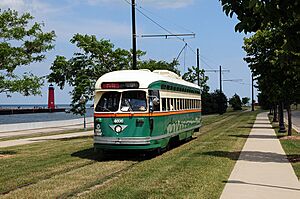
The Metra commuter train connects Kenosha to Downtown Chicago. Many people use this train to travel between southeastern Wisconsin and Chicago for work.
Since 2000, a 2-mile streetcar line has served downtown Kenosha and HarborPark. It connects the Metra station to downtown and several parks. Kenosha is one of the smallest cities in America with a streetcar system.
Kenosha also has a city bus network with eight routes. Kenosha was the first city to use color-coded bus routes and electric trolley buses for public service, starting in 1932.
Main Roads
Major highways that pass through or near Kenosha include:
- I-94 / US 41 (connecting Milwaukee and Chicago)
- WI-50
- WI-31 (Green Bay Road)
- WI-32 (Sheridan Road)
- WI-158
- WI-165
Train Service
Kenosha has had train service to Chicago since 1855. Today, the Union Pacific Railroad and the Canadian Pacific Railway operate freight lines through the city.
Airport Access
Kenosha Regional Airport (KENW) serves the city. For bigger flights, people can use O'Hare International Airport in Chicago (about 52 miles north) or General Mitchell International Airport in Milwaukee (about 32 miles south).
Famous People from Kenosha
Many notable people have come from Kenosha. You can find a full list in the main article about people from Kenosha, Wisconsin.
Sister Cities
Kenosha has special connections with cities around the world, called "sister cities":
- Cosenza, Italy (since 1979)
- Douai, France (since 1981)
- Quezon City, Philippines (since 1986)
- Wolfenbüttel, Germany (since 1970)
See also
 In Spanish: Kenosha para niños
In Spanish: Kenosha para niños
 | John T. Biggers |
 | Thomas Blackshear |
 | Mark Bradford |
 | Beverly Buchanan |


